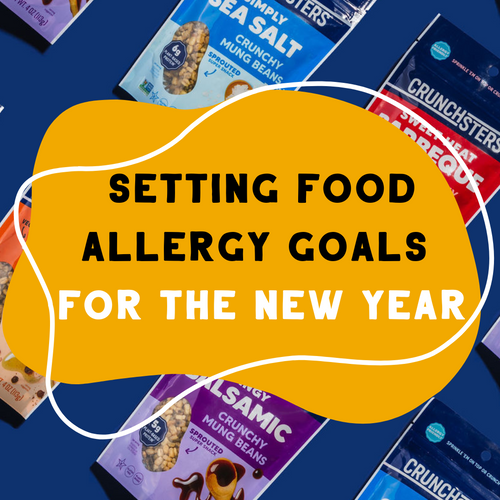

Setting Food Allergy Goals for the New Year
The new year is the perfect time to reflect and set intentions for the months ahead. For families managing food allergies, setting practical goals can help bring peace of mind and make daily life easier. From organizing your kitchen to planning safe meals, here are some achievable goals to kick off the new year with confidence.
1. Organize Your Kitchen for Allergy Safety
A well-organized kitchen can make a big difference in avoiding cross-contact and ensuring that allergy-safe foods are easily accessible.
-
Label allergy-safe zones: Designate specific areas of your kitchen, such as a shelf or cabinet, for allergy-safe foods and ingredients. Clearly label these areas so everyone in the household knows where to find (and store) safe items.
-
Organize with separate utensils: Consider having separate utensils, cutting boards, and storage containers dedicated to allergy-safe foods to minimize cross-contact risk.
-
Stock up on essentials: Restock your pantry with allergy friendly staples like your families' favorite snacks, baking ingredients, and go-to meal items. Knowing you have safe options on hand can reduce stress when preparing meals.
2. Create a Weekly Meal Plan with Allergy Friendly Recipes
Meal planning can help ensure that each meal is safe, balanced, and enjoyable. It’s also a great way to make grocery shopping more efficient and minimize last-minute meal prep stress.
-
Start with familiar favorites: Make a list of your family’s favorite allergy friendly meals, and incorporate them into your weekly plan. If you're looking for inspiration, Allergic Livings Recipes are a treasure trove of allergy friendly, family favorites.
-
Explore new recipes: Add variety by trying new allergy friendly recipes once a week. Consider adding some Free2b treats to your lineup for desserts or snacks.
-
Prep ahead: Spend some time each week prepping ingredients or meals to save time on busy days. Chopping veggies, marinating proteins, or pre-portioning snacks can streamline meal prep.
3. Update Your Emergency Action Plan and Supplies
The new year is a good time to review your child’s emergency action plan and ensure you have all necessary supplies on hand. This step can bring peace of mind and ensure everyone is prepared in case of an allergic reaction.
-
Review your action plan: Revisit your child’s emergency plan with family members and caregivers. Make sure everyone knows the steps to take in case of an allergic reaction, and ensure your plan is up-to-date with any recent changes.
-
Check expiration dates: Double-check the expiration dates on epinephrine auto-injectors, antihistamines, and other emergency medications. Replace any expired items so you’re fully prepared.
-
Prepare a travel kit: If your family is on the go often, create a portable allergy kit with medications, allergy friendly snacks, and a copy of the emergency action plan to carry with you.
4. Educate Family, Friends, and Caregivers
Increasing awareness among those close to your family can make a big difference in keeping your child safe. The new year is an opportunity to refresh and share information about your child’s allergies with important people in their life.
-
Schedule a family meeting: Have a discussion with family members about the importance of allergy safety, especially if there are new people in your child’s life.
-
Send out an allergy info sheet: Create a simple, one-page document listing your child’s allergens, emergency protocols, and helpful tips. This is especially useful for babysitters, teachers, and extended family.
-
Empower your child: If your child is old enough, involve them in conversations about their allergies and encourage them to speak up about their needs in social situations.
5. Connect with Food Allergy Communities for Support
The journey of managing food allergies can be isolating, but connecting with others who understand your experience can provide both emotional support and practical advice. Make it a goal to engage with food allergy communities this year.
-
Join a support group: Look into groups like Kids with Food Allergies (KFA) or the No Nuts Moms Group (NNMG) Food Allergic Families. Many of these organizations offer local chapters or online forums where you can connect with other families.
-
Follow food allergy blogs and social media: Stay updated on the latest in allergy-friendly products, recipes, and advocacy efforts. Following food allergy influencers or organizations like Food Allergy Research & Education (FARE) and Food Allergy & Anaphylaxis Connection Team (FAACT) can provide valuable insights and community.
-
Attend virtual events: Look for webinars, workshops, or virtual conferences hosted by allergy organizations. These events often cover helpful topics and connect you with experts in the field.
6. Set Personal Goals for Stress Management
Managing food allergies can be stressful, so prioritizing self-care is essential. Setting personal goals for stress management can help keep you centered and resilient as you navigate food allergy challenges throughout the year.
-
Practice mindfulness: Incorporate mindfulness exercises, such as meditation or breathing exercises, into your routine to help you stay calm and focused.
-
Schedule time for yourself: Dedicate time each week to unwind and do something you enjoy, whether it’s a hobby, exercise, or simply relaxing.
-
Find resources to reduce anxiety: Explore tools or support networks designed to help food allergy families manage stress. Support groups can be a valuable source of encouragement and tips from other parents.
Starting the New Year with Confidence and Peace of Mind
Setting food allergy goals for the new year can bring structure, safety, and reassurance to your family’s life. From organizing your kitchen to educating others and planning meals, these achievable goals will help you start the year with confidence. With the right strategies in place, you can embrace each day knowing you’re prepared and fully equipped to keep your family safe.
For safe and allergy friendly treats, visit Free2b Foods.
